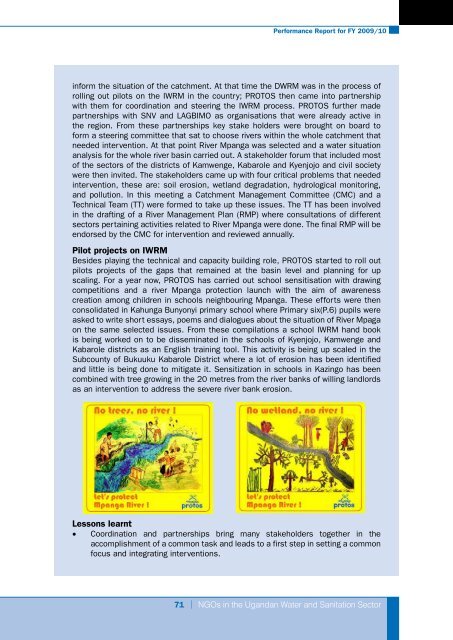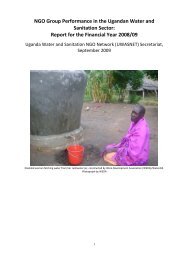Performance Report for FY 2009/10 - UWASNET
Performance Report for FY 2009/10 - UWASNET
Performance Report for FY 2009/10 - UWASNET
Create successful ePaper yourself
Turn your PDF publications into a flip-book with our unique Google optimized e-Paper software.
<strong>Per<strong>for</strong>mance</strong> <strong>Report</strong> <strong>for</strong> <strong>FY</strong> <strong>2009</strong>/<strong>10</strong><br />
in<strong>for</strong>m the situation of the catchment. At that time the DWRM was in the process of<br />
rolling out pilots on the IWRM in the country; PROTOS then came into partnership<br />
with them <strong>for</strong> coordination and steering the IWRM process. PROTOS further made<br />
partnerships with SNV and LAGBIMO as organisations that were already active in<br />
the region. From these partnerships key stake holders were brought on board to<br />
<strong>for</strong>m a steering committee that sat to choose rivers within the whole catchment that<br />
needed intervention. At that point River Mpanga was selected and a water situation<br />
analysis <strong>for</strong> the whole river basin carried out. A stakeholder <strong>for</strong>um that included most<br />
of the sectors of the districts of Kamwenge, Kabarole and Kyenjojo and civil society<br />
were then invited. The stakeholders came up with four critical problems that needed<br />
intervention, these are: soil erosion, wetland degradation, hydrological monitoring,<br />
and pollution. In this meeting a Catchment Management Committee (CMC) and a<br />
Technical Team (TT) were <strong>for</strong>med to take up these issues. The TT has been involved<br />
in the drafting of a River Management Plan (RMP) where consultations of different<br />
sectors pertaining activities related to River Mpanga were done. The final RMP will be<br />
endorsed by the CMC <strong>for</strong> intervention and reviewed annually.<br />
Pilot projects on IWRM<br />
Besides playing the technical and capacity building role, PROTOS started to roll out<br />
pilots projects of the gaps that remained at the basin level and planning <strong>for</strong> up<br />
scaling. For a year now, PROTOS has carried out school sensitisation with drawing<br />
competitions and a river Mpanga protection launch with the aim of awareness<br />
creation among children in schools neighbouring Mpanga. These ef<strong>for</strong>ts were then<br />
consolidated in Kahunga Bunyonyi primary school where Primary six(P.6) pupils were<br />
asked to write short essays, poems and dialogues about the situation of River Mpaga<br />
on the same selected issues. From these compilations a school IWRM hand book<br />
is being worked on to be disseminated in the schools of Kyenjojo, Kamwenge and<br />
Kabarole districts as an English training tool. This activity is being up scaled in the<br />
Subcounty of Bukuuku Kabarole District where a lot of erosion has been identified<br />
and little is being done to mitigate it. Sensitization in schools in Kazingo has been<br />
combined with tree growing in the 20 metres from the river banks of willing landlords<br />
as an intervention to address the severe river bank erosion.<br />
Lessons learnt<br />
• Coordination and partnerships bring many stakeholders together in the<br />
accomplishment of a common task and leads to a first step in setting a common<br />
focus and integrating interventions.<br />
71 | NGOs in the Ugandan Water and Sanitation Sector



